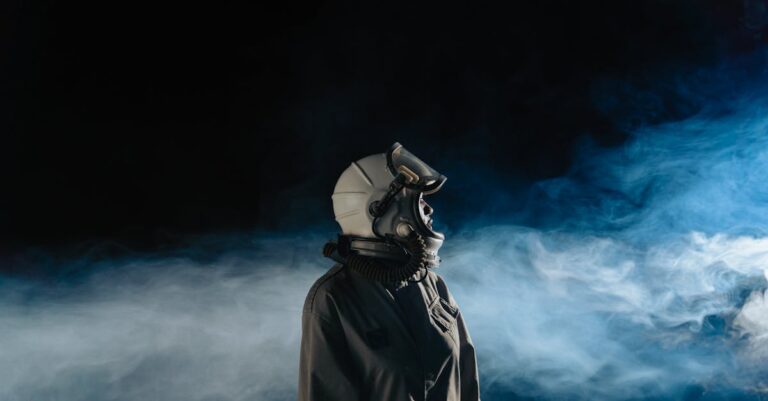
Mara traced the grooves in the metal chair with her fingertips, the cold seeping through her gloves. The fluorescent light above hummed, casting a sickly glow over the sterile room. She had no memory of how she’d gotten here, only that the air reeked of antiseptic and something sharper—burnt circuitry. A flicker of movement in the corner of her vision made her freeze. The door was sealed, steel and unyielding. Her breath came shallow, each inhale a battle against the metallic tang in the air.
A voice crackled through the intercom, distorted and thin. “You are safe.” The words felt like a lie, sliding off her skin. She pressed her palm against the chair’s armrest, feeling the ridges of a name etched into the metal: *Elias Voss*. The letters were fresh, still gleaming with the promise of something she couldn’t name. Her head throbbed, a dull ache that pulsed in time with the light’s flicker.
The door hissed open. A man stood in the threshold, his face obscured by a visor that reflected the room’s harsh light. “You’re late,” he said, his voice flat, mechanical. “We’ve been waiting for you.” He stepped inside, and the air shifted—cooler, heavier. Mara’s fingers curled into the chair’s armrest, her nails biting into the metal. “Who are you?” she asked, her voice hoarse.
The man tilted his head, as if considering her. “You know who I am,” he said. “You just don’t remember.” He reached into his coat, and Mara tensed. A small device hovered in his palm, its surface rippling like liquid. “This will help.” He pressed it against her temple, and the world dissolved.
When she opened her eyes, she was in a different room. The walls were lined with monitors, their screens blinking with streams of data. A woman sat at a desk, her back to Mara. She turned slowly, her face a mosaic of scars. “You’re late,” she said, mirroring the man’s words. “We’ve been waiting for you.” Her voice was softer, but no less sharp.
Mara’s pulse quickened. “Where am I? What are you doing to me?” The woman stood, her movements deliberate. “You’re in a safe place,” she said. “But you’re not safe. Not yet.” She walked to a console and tapped a sequence of keys. A file appeared on the screen: *Project Echelon*. The name sent a shiver through Mara’s spine, though she didn’t know why.
“What is this?” Mara asked, stepping closer. The woman’s gaze didn’t waver. “You were a test subject,” she said. “A prototype. They thought you could withstand the process.” Her fingers hovered over the keyboard, then she hit enter. The screen filled with images—Mara, lying in a hospital bed, her eyes closed. A man in a lab coat stood beside her, his face obscured. “They erased you,” the woman said. “Piece by piece.”
Mara’s breath caught. “Erased?” The word felt foreign, like a key turning in a lock she didn’t recognize. The woman nodded. “You were designed to remember what others couldn’t. But they couldn’t risk it. So they made you forget.” She turned back to the screen, scrolling through more files. “You’re not the first. But you might be the last.”
The room seemed to shrink, the walls pressing in. Mara’s hands trembled. “Who are *they*?” The woman’s expression hardened. “You’ll find out,” she said. “But be careful. Every truth you uncover will cost you something.” She pointed to the screen. “Look.”
The images shifted. Mara saw herself—older, sharper, her eyes filled with purpose. She was in a room like this one, but the walls were different. The people around her weren’t wearing lab coats. They were soldiers. “This is what they made you into,” the woman said. “A weapon. But you’re not fully weaponized yet.”
Mara’s stomach twisted. “I don’t understand.” The woman’s voice dropped to a whisper. “You were meant to remember. But they didn’t want you to. So they broke you.” She stepped closer, her scars catching the light. “You have to decide, Mara. Do you want to remember? Or will you let them keep you like this?”
The intercom buzzed again, cutting through the silence. “Subject 7-A is unstable,” a voice said. “Initiating containment protocol.” The woman’s face paled. “They’re coming for you.” She grabbed Mara’s arm, her grip firm. “You have to run. Before they erase you completely.”
Mara’s mind raced. She didn’t know what was real, what was a lie. But the fear in the woman’s eyes was unmistakable. “Where do I go?” she asked. The woman hesitated, then pulled a key from her pocket. “Find the archive,” she said. “It’s in the old sector. But be careful. They’ll be watching.”
The door slammed open. Three figures in black uniforms stormed in, their faces hidden behind masks. The woman shoved Mara toward the exit. “Go!” she screamed. Mara stumbled, her legs unsteady. The world blurred as she ran, the sound of footsteps pounding behind her.
She didn’t know where she was going, only that she had to keep moving. The city outside was a blur of neon and shadow, the air thick with the smell of rain and oil. She clutched the key tight, its edges digging into her palm. Every step felt like a battle, every breath a reminder of the fragments she’d lost.
But she couldn’t stop. Not now. Not when the truth was within reach.
The archive was hidden beneath the city, a labyrinth of tunnels and forgotten corridors. Mara navigated the maze, her footsteps echoing in the silence. The key fit into a rusted door, and it creaked open to reveal a room filled with files, data drives, and old equipment. She moved through the chaos, her hands brushing over stacks of documents.
Then she saw it—a terminal, its screen glowing faintly. She sat down, her fingers trembling as she typed. The files were encrypted, but she had no time to break the code. She pulled a drive from her pocket and inserted it. The screen flickered, then displayed a single word: *Project Echelon*.
The files began to load. Mara’s eyes scanned the text, her breath quickening. The project was a memory-altering experiment, designed to create individuals who could access restricted information. But something had gone wrong. The subjects—like her—had begun to lose themselves, their identities dissolving into nothingness.
A new file appeared: *Subject 7-A*. Mara’s name. The details were fragmented, but the core was clear: she had been a key player in the project, a test subject who had resisted the erasure. But they hadn’t been able to fully control her. So they’d tried again, over and over, each attempt leaving her more broken.
A sudden noise made her freeze. The door creaked open. She turned, heart pounding. A man stood in the threshold, his face partially visible. “You shouldn’t be here,” he said. His voice was familiar, but she couldn’t place it.
“Who are you?” she asked, her voice steady despite the fear.
The man stepped closer, his expression unreadable. “I’m the one who tried to save you,” he said. “Before they took you again.”
Mara’s breath caught. “You know me?”
He nodded. “I was your partner. Before they erased me too.”
The words hit her like a blow. She had no memory of him, but something about him felt right, like a missing piece of a puzzle she couldn’t see. “What happened to you?” she asked.
He hesitated, then said, “They took me. But I remember. I remember what they did to you, to all of us.” His voice was quiet, but filled with conviction. “You’re the only one who can stop them.”
Mara’s mind reeled. She didn’t know if she could trust him, but the weight of his words felt too heavy to ignore. “How?” she asked.
He stepped closer, his eyes searching hers. “You have to remember. Not just the facts, but the emotions. The pain, the fear, the hope. That’s what they took from you. If you can get it back, you can fight them.”
Mara looked down at the terminal, at the files that held her history—what little of it remained. She didn’t know if she could do it. But she knew she had to try.
The door slammed open again, and the man pulled her into a tight embrace. “Go,” he said. “I’ll hold them off.”
Mara hesitated, then nodded. She turned and ran, the files and memories swirling in her mind. The truth was there, waiting for her. And she would find it, no matter the cost.
The city outside was a blur of neon and shadow, the air thick with the smell of rain and oil. She clutched the key tight, its edges digging into her palm. Every step felt like a battle, every breath a reminder of the fragments she’d lost.
But she couldn’t stop. Not now. Not when the truth was within reach.
The archive was hidden beneath the city, a labyrinth of tunnels and forgotten corridors. Mara navigated the maze, her footsteps echoing in the silence. The key fit into a rusted door, and it creaked open to reveal a room filled with files, data drives, and old equipment. She moved through the chaos, her hands brushing over stacks of documents.
Then she saw it—a terminal, its screen glowing faintly. She sat down, her fingers trembling as she typed. The files were encrypted, but she had no time to break the code. She pulled a drive from her pocket and inserted it. The screen flickered, then displayed a single word: *Project Echelon*.
The files began to load. Mara’s eyes scanned the text, her breath quickening. The project was a memory-altering experiment, designed to create individuals who could access restricted information. But something had gone wrong. The subjects—like her—had begun to lose themselves, their identities dissolving into nothingness.
A new file appeared: *Subject 7-A*. Mara’s name. The details were fragmented, but the core was clear: she had been a key player in the project, a test subject who had resisted the erasure. But they hadn’t been able to fully control her. So they’d tried again, over and over, each attempt leaving her more broken.
A sudden noise made her freeze. The door creaked open. She turned, heart pounding. A man stood in the threshold, his face partially visible. “You shouldn’t be here,” he said. His voice was familiar, but she couldn’t place it.
“Who are you?” she asked, her voice steady despite the fear.
The man stepped closer, his expression unreadable. “I’m the one who tried to save you,” he said. “Before they took you again.”
Mara’s breath caught. “You know me?”
He nodded. “I was your partner. Before they erased me too.”
The words hit her like a blow. She had no memory of him, but something about him felt right, like a missing piece of a puzzle she couldn’t see. “What happened to you?” she asked.
He hesitated, then said, “They took me. But I remember. I remember what they did to you, to all of us.” His voice was quiet, but filled with conviction. “You’re the only one who can stop them.”
Mara’s mind reeled. She didn’t know if she could trust him, but the weight of his words felt too heavy to ignore. “How?” she asked.
He stepped closer, his eyes searching hers. “You have to remember. Not just the facts, but the emotions. The pain, the fear, the hope. That’s what they took from you. If you can get it back, you can fight them.”
Mara looked down at the terminal, at the files that held her history—what little of it remained. She didn’t know if she could do it. But she knew she had to try.
The door slammed open again, and the man pulled her into a tight embrace. “Go,” he said. “I’ll hold them off.”
Mara hesitated, then nodded. She turned and ran, the files and memories swirling in her mind. The truth was there, waiting for her. And she would find it, no matter the cost.


